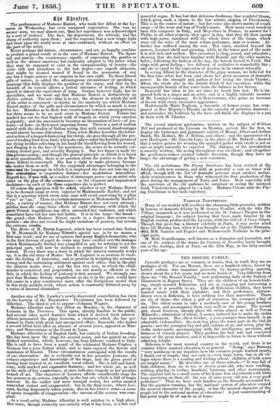tOt tt4ratrm
The performance of Madame Ristori who Made her debut at the Ly- ceum on Wednesday, has even surpassed expectation. She was no sooner seen, we may almost say, than her supremacy was acknowledged by a sort of instinct. The face, the deportment, the attitude' had the stamp of authority upon them ; and the rumours that a new tragic light had risen upon the world were at once confirmed, without an effort on the part of the artist. Never perhaps did nature, circumstance, and art, so happily combine to produce a grand result as in the case of Madame Ristori. The figure tall and stately—the countenance capable of expressing the gentler as well as the sterner emotions, but eminently adapted to the latter when they may be supposed to exist in the companionship of beauty—the voice rich and melodious to the last degree—are superb elements, that might be deemed wasted if found in the possession of any one but a tragic actress or an empress in her own right. To those liberal gifts of nature, is added the advantageous circumstance of speaking a language that fully displays the qualifies of the organ, and that by the breadth of its vowels allows a lyrical utterance of feeling, in which speech is almost the equivalent of song. Genius, however high, has its specialties, and we must say that Madame Ristori is distinctively an Dalian actress. The art—that is to say, the element in which the will of the artist is concerned—is shown in the masterly use which Madame Ristori makes of the gifts and circumstances by which so much is done for her. Mistakes as to their true vocation are common among geniuses, Ind there seems to be no such error in Madame Ristori. Nature has marked her out for that highest walk of tragedy in which every emotion Is gigantic; and she successively becomes an incarnation of love—of jea- lousy—of hate—in their most imposing forma. There is a sort of !cell= mixed with the ideality of Italian acting, that with natural disadvantages would almost become ridiculous. Thus, when Medea describes the infuri- ated action of a leopard destroying his victim, she goes through all the pro- cess of rending limb from limb; when she calls to mind the horrible picture of her dying brother collecting in his hand the blood flowing from his wound, and flinging it in the face of his murderers, she seems to be actually col- lecting clotted gore, and actually flinging it. But her figure is made for this picture-acting; and though the general principle on which it is based is most questionable, there is no question about the matter so far as Ma- dame Ristori is concerned. She has a right to make pictures, because -she makes them so well. Of the conjoined advantages belonging to the voice sad the language in which it is employed she does not lose one jot. er artioulatioa is exquisitely distinct—her modulation marvellous. Regard her if-you-will, as a maker of statuesque poses—as an artist who relies on die play of the comitenance—as the eloquent and impassioned declaimer—in each of the three capacities she is perfect. Of course the question will be asked, whether or not Madame Ristori is to be deemed equal or even superior teMademoiselle Rachel ; and yet this is a question which every wise man will avoid answering by a plain "yea" or "no." There is a certain minuteness in Mademoiselle Rachel's style, a variety & nuance, that Madame Ristori does not even attempt ; _neither does she essay those effects of rapid utterance with which the great French tragedienne has often astounded her audience, and which sometimes have led her into bad habits. It is in the large—the broad— the grand—that Madame Ristori excels to a degree that scorns com- parison she does not record the slight variations of passion, but reveals the extreme results.
The Nettie of M. Ernest Logouvd, which has been turned into Italian by M. Montanelli for Madame - "s special use, is by no means a first-rate work; and we are of opinion that many English dramatists, who in the first fervour of esprit de corps may have exulted over the damages which Mademoiselle Rachel was compelled to pay for refusing to act the principal part, will now be inclined to sympathize a little with the actress. If ever there was a story in which the interest naturally works up, it is the old story of Medea : but M. Legouve is so anxious to vindi- cate the feeling of maternity, and so prudent in weighing the actuating wrong and the restraining sentiment against each other, that in the play the interest works down ; and the last two acts, in which the child- murder is conceived and perpetrated, are not nearly so efficient as the first, in which the feeling of jealousy is first aroused. We strongly sus- pect that Madame Ristori, magnificent as she is in the part, would have felt easier in a play constructed more after the Euripidean model than in this truly modern work, where action is constantly frittered away by a series of internal skirmishes.


































 Previous page
Previous page